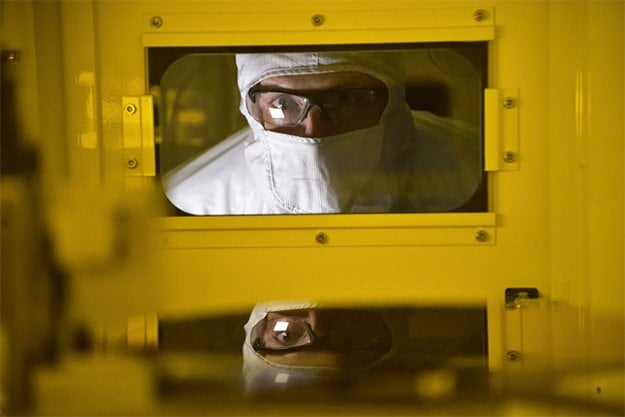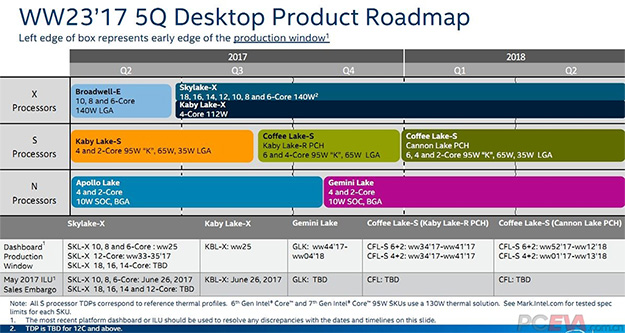Intel Coffee Lake Platform And 300-Series Chipset Detailed, Q3 Launch Possible

Intel is getting ready to launch its 8th generation Core processor lineup, otherwise known as Coffee Lake. There is not a whole lot we know about Coffee Lake at this point, other than it being another 14-nanometer refresh (Cannon Lake will represent a move to 10nm). While we await official word from Intel, leaked specs seem to have found their way to the web.
A Chinese-language website claims to have confirmed a fleshed out desktop lineup consisting of five Coffee Lake processors, include two Core i7 chips, two Core i5 models, and a single Core i3 SKU, the latter of which will be the only one of the bunch with less than six physical cores (it's a quad-core chip with Hyper Threading support).
Let's break it down:
- Core i7-8700K: 6C/12T, 3.5GHz to 4.3GHx (4.7GHz single-core Turbo), 95W TDP
- Core i7-8700: 6C/12T, 3.2GHz to 4.3GHz (4.6GHz single-core Turbo), 65W TDP
- Core i5-8600K: 6C/6T, 3.6GHz to 4.1GHz (4.3GHz single-core Turbo), 95W TDP
- Core i5-8400: 6C/6T, 2.8GHz to 3.8GHz (4GHz single-core Turbo), 65W TDP
- Core i3-8300: 4C/8T, 4GHz (no Turbo clocks), TDP unknown
Assuming the above roadmap is legitimate, Intel will launch its Coffee Lake-S (mainstream) line sometime this quarter. Coffee Lake will also roll out with a new 300-series chipset. Unfortunately, it looks like Intel will probably require a motherboard upgrade in order to run a Coffee Lake processor, though nothing is set in stone.
Coffee Lake processors will use the same LGA 1151 socket as Kaby Lake. However, a prominent motherboard manufacturer responded to a user question on Twitter about compatibility with existing motherboards by saying that Coffee Lake will not be supported on the 200-series chipset. Intel is commenting publicly on the matter, though behind the scenes, there is chatter that its hardware partners are pressuring the company to change its mind before launch.
Regardless of compatibility, it looks like Intel is planning to launch a Z370 chipset alongside Coffee Lake, which will remain relevant at least through the second quarter of next year. Interestingly the roadmap also carves out a big chunk for a "Coffee Lake-S Platform Chipset" in the beginning of next year and into the second quarter, with new platforms set to replace the H270, B110, and H110 chipsets.
The more interesting part of the leak comes in the form of a slide outlining various details about Coffee Lake. Here are some of the highlights:
- Increased multi-thread performance with up to 6 cores and 12 threads
- Enahnced IA and memory overclocking
- Intel Turbo Boost Technology 2.0
- Improved media display capabilities
- REC.2020 and HDR support, HEVC 10-bit + VP9 10-bit hardware decode/encode, 4K support
- Integrated USB 3.1 Gen 2 (10Gbps)
- Intel Wireless-AC support (802.11ac R2 and Bluetooth 5)
- Intel Optane Memory support
- Intel Smart Sound Technology with quad-core audio DSP
- Support for Modern Standby
Finally, shown above is a slide outlining Coffee Lake's new features versus Kaby Lake. The new chips will break down into three rated TDPs, including 95W for higher performing parts (enthusiasts), 65W for the mainstream lineup, and 35W for the low power CPUs.
Other highlights include:
- Dual-channel DDR4-2666 support
- Up to 30 chipset high-speed I/O lanes
- 24 chipset PCIe 3.0 lanes
- 10 USB 3.1 ports with up to 6 USB 3.1 Gen 2 (10Gbps) ports
- Up to 6 SATA 6Gbps ports
- Intel Rapid Storage Technology 16
- PCIe 3.0 x4 storage support
- CPU attached Intel PCIe storage





